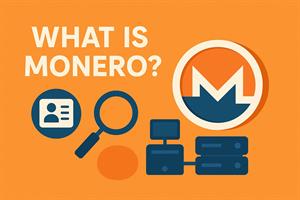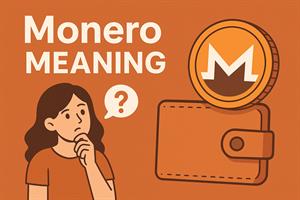What Is Monero?
-
Blog
›
-
What Is Monero?
Last updated: September 5th, 2025
What Is Monero? (Beginner-Friendly 2025 Guide)

Quick Definition
- Monero (XMR) is a privacy-focused, open-source cryptocurrency launched in 2014 that aims to make every payment confidential and fungible by default.
- It uses advanced cryptography so senders, recipients, and amounts are hidden on-chain while still allowing the network to verify transactions.
Why People Use Monero
- Privacy by default: All normal transactions are confidential—no extra settings required.
- Fungibility: Because coins are indistinguishable on-chain, each XMR unit is treated the same, improving acceptability as money.
- Decentralization: Community-run project with no central issuer; anyone can verify the rules by running a node.
- Accessibility: CPU-friendly mining and easy-to-use wallets make it simple to participate.
How Monero Hides Transaction Data
- Stealth addresses: The receiver publishes a single address, but each payment goes to a one-time address derived from it—observers can’t link incoming payments to the receiver’s public address.
- Ring signatures: The sender’s real input is mixed with decoys (a “ring”), so outsiders can’t tell which coin was actually spent. Modern Monero uses a fixed ring size so all transactions look similar.
- RingCT (Confidential Transactions): Amounts are hidden using cryptographic commitments, so values are verifiable by the network but not visible to the public.
- View keys (selective transparency): A wallet owner can share a read-only key with an auditor or exchange to prove incoming funds without exposing spending keys.
Consensus, Supply & Mining
- Consensus: Proof-of-Work with the RandomX algorithm, designed to run well on CPUs to discourage specialized mining hardware and support broader participation.
- Block time: ~2 minutes (dynamic block size helps absorb bursts of activity).
- Tail emission: After the main emission ended, Monero entered a perpetual tail emission (a small ongoing block reward, e.g., 0.6 XMR per block) to keep miners incentivized long-term and maintain security.
Using Monero Day-to-Day
- Wallets: Popular options include the official Monero GUI/CLI for desktop, and mobile wallets such as Monero.com by Cake Wallet, Cake Wallet, and Monerujo for Android. Always download from official links.
- Running a node: Point your wallet to your own node for maximum privacy, or use a trusted remote node if you’re just getting started.
- Spending XMR: A growing list of merchants and services accept Monero for goods, services, gift cards, VPNs, hosting, and more (see community directories like Monerica).
What Monero Is (and Isn’t)
- Monero is a digital cash system that prioritizes financial privacy, censorship-resistance, and permissionless access.
- Monero isn’t a magic cloak: smart operational security still matters (fresh subaddresses, trusted software, careful network practices).
- Legal note: Availability and regulations vary by country; always follow applicable laws where you live.
Common Questions
- Is Monero traceable? Monero’s design obscures sender, receiver, and amount. While researchers may propose heuristics, Monero continually improves to reduce metadata leakage.
- Can I reveal a payment for accounting? Yes—share your view key or export a payment proof for a specific transaction.
- How do I get XMR? Swap other crypto to XMR via instant exchanges, use P2P markets, or use compliant centralized exchanges where supported.
Best Practices
- Download wallets from official sources and verify signatures when possible.
- Back up your 25-word seed securely (offline). Your seed = your funds.
- Use fresh subaddresses for new counterparties and consider running your own node for stronger privacy.
Further Reading (Official Docs)
TL;DR
- Monero is private, fungible digital cash.
- It hides sender, receiver, and amount using stealth addresses, ring signatures, and RingCT.
- CPU-friendly mining (RandomX) and a small tail emission help keep the network decentralized and secure.
Comments
No Comments
Subscribe To Our Newsletter!
Monero Directory | Monerica Blog Sitemap
Disclaimer: some links may be affiliate links, in which we receive compensation.


